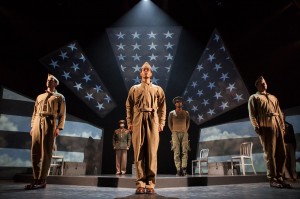In 2008, as director Ricardo Khan was co-writing Fly with Trey Ellis, he made sure to be present as the Tuskegee Airmen were being honored at President Barack Obama’s inauguration. His realization was that the moment was set aside to recognize all the doors that these brave Americans opened. But for all the courage, perseverance and patriotism that propelled them, patience may have been the strength this corps of African-American fighter pilots needed most to see through their dream of making America a better place. OffOffOnline: What did they return to?
Khan: A country that seemed more racist than when they left. Rosa Parks, Jackie Robinson and the civil rights movement — it took a long time to fully see the tide turn.
OffOffOnline: How much of the story do you tell?
Khan: The training they undertook in Tuskegee, and dealing with the Jim Crow laws, segregation, and instructors and politicians who just did not want them to be there. But we begin and end the play with the inauguration.
OffOffOnline: How long has their story been part of you?
Khan: Since I was very young when I saw a picture of them that just fascinated me. The pride and the stance they were all taking — tall, well dressed and very proper like they were ready to change the world.
OffOffOnline: How is Fly different than other telling's of this story?
Khan: We have an interest in being able to tell the story of individual people so they’re not just figures in history. Then taking all the different personalities and egos, the play is about coming together as a team. That’s an important part of the way we did it. Because unlike television or movies, theater has a magical capacity to connect the actors to the audience to a point where you become a community. This hopefully leaves the audience walking out just a little better a person than when they walked in.
OffOffOnline: How do you show the strength of these men when it would have been easier to be resentful toward America?
Khan: This wasn’t a time when people were saying, "I don’t like my country." They were saying the opposite and wanted to be part of making a difference. Of course, they realized as bad as American racism was, fascism was worse. So they wanted to contribute, and believed if they could succeed, maybe one day racism could be toppled.
OffOffOnline: Tell me about the airmen (Brooks Brantley, Desmond Newsom, Omar Edwards and Terrell Wheeler), and the range of emotions they exhibit?
Khan: There is a huge range of emotions they represent — some are more filled with range, others with optimism. But at the same time, they’re young and in the army and not everything can be expressed. They’re also black, which means representing their race, and that adds to all the pressures to restrict their emotions. So we use an African and hip-hop rooted tap dance to convey the emotions that can’t be told in words.
OffOffOnline: How did you come up with this idea?
Khan: I wanted to find a way to grab the attention of a present-day audience so they weren’t just listening but were fully immersed. Tap ties to the '40s and hip-hop provides a hook to today so that it doesn’t feel like a history lesson.
OffOffOnline: How do you create action in the play?
Khan: We use video projections and tap to help create this world, but little props create the real action. All I have is four chairs and the airman’s trunks, and by manipulating them into different positions, the message comes across. So we might tilt a trunk up to symbolize a soda counter. The approach allows me to be as creative as I can to challenge the audience. As a result, the viewers are able to use their imagination to create a world in which we are not just feeding them information.
OffOffOnline: How hard is it to watch the play without being able to stop the action like in a film?
Khan: It’s extremely hard. But I’m doing another play in St. Louis so I’m going to preview the rehearsal today [March 1] and give my notes. Then I’m flying out, so in a way, I’m getting a reprieve.
OffOffOnline: Finally, what’s the message you hope people take away?
Khan: Don’t believe what you’re being fed about how different we are because of the color of your skin or if you’re a Republican or a Democrat. We are all in this together, and chapters in history like the Tuskegee Airmen, truly shows the ways in which we are the same outweigh the ways in which we are different.
Fly is running at the New Victory Theater (209 West 42nd St. between 7th and 8th Aves.) in Manhattan until March 27. Performance times vary. Tickets range from $15-$38 and can be purchased at http://www.newvictory.org/Show-Detail.aspx?ProductionId=6912.







